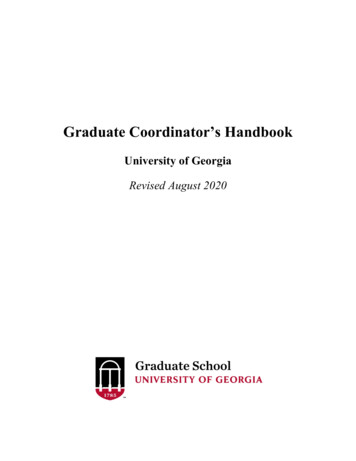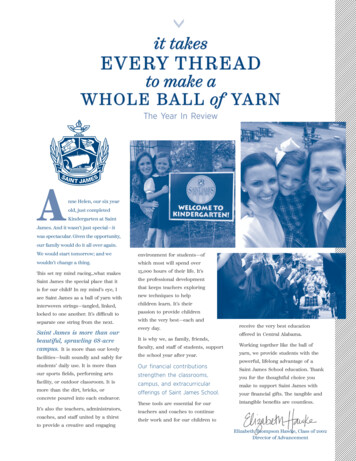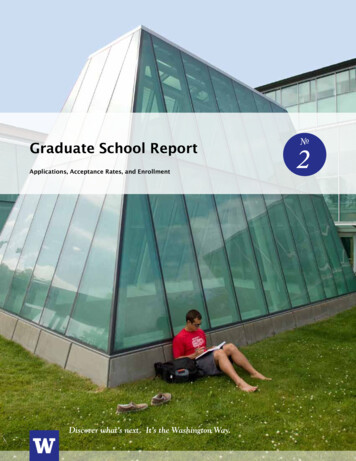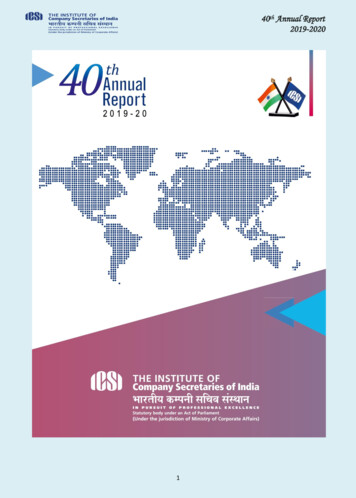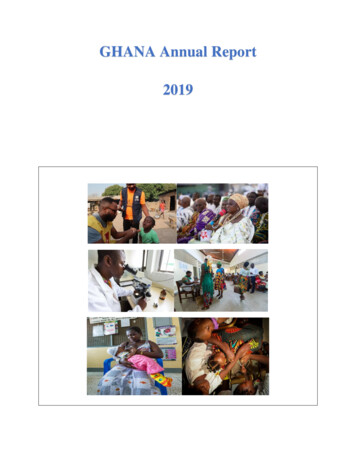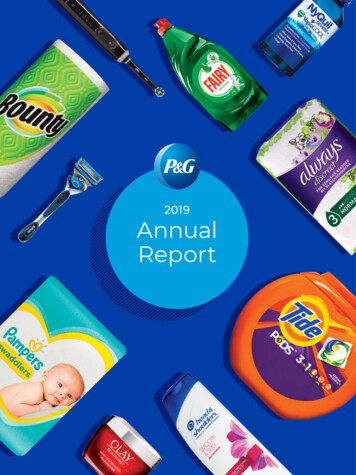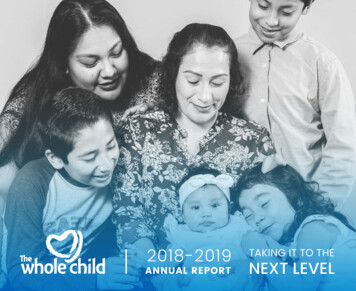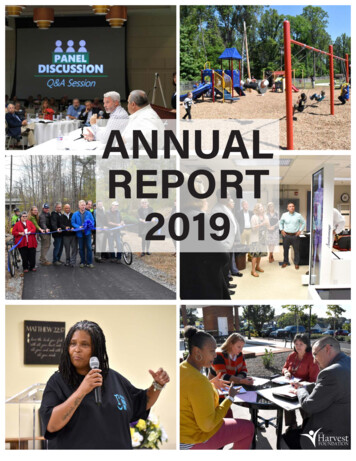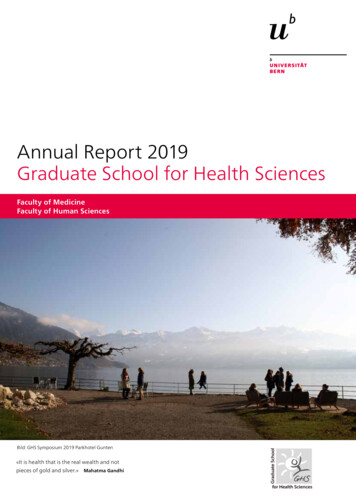
Transcription
Annual Report 2019Graduate School for Health SciencesFaculty of MedicineFaculty of Human SciencesBild: GHS Symposium 2019 Parkhotel Gunten«It is health that is the real wealth and notpieces of gold and silver.» Mahatma Gandhi
GHS Annual Report 2019Table Of Contents Introduction4-5 Mission and Purpose6 Organization78-9 Organization Chart Steering Committee10-11 Expert Committees12-13 PhD Program14 PhD Program Structure15 Clinical Sciences PhD Program16 MD-PhD Scholarsihp17 Year in Review - Doctoral Candidates18-25 Courses and Seminars26 Partner Programs27 Graduations28-29 Publications30-35 GHS Symposium36-37 Acknowledgments38Page: 3
Introductionmedical Sciences (GCB), which preceded theNoteworthy GHS highlights from 2019:Furthermore, the GHS welcomed two newGHS, and was its operational director since The GHS enjoyed a 50% increase in en-expert committee members:its inception in 2005. Dr. Wolf accepted therollment over 2018, ending 2019 with (GHS) of the University of Bern was foundedresponsibility for coordinating the Graduatea total of 88 studentsin 2008 under the joint direction of the Fa-School for Health Sciences (GHS) in additionLetter from the PresidentThe Graduate School for Health Sciences Prof. Dr. Jennifer Inauen (FKI), Assistant Professor of Health PsychologyThe new Expert Committee III, Clinicaland Behavioral Medicineculty of Medicine and the Faculty of Humanto the GCB in 2008. The GHS PhD Steeringscience has raised significant interestSciences. The vision was to offer a PhD pro-Committee wishes to thank Dr. Wolf for herresulting from the innovative 50:50of Statistics and Methodolgy at thegram based on research on psychologicalinfluential role in establishing and coordi-modelBerne Institute for Family Medicineand physiological factors that determinenating the GHS from its early years, and forGHS Symposium in Gunten was a suc-(BIHAM) Dr. phil. Cinzia del Giovane (FKI), Headthe health of individuals and groups in theirbeing a visionary and driving force on behalfcess and was attended by a recordsocial contexts and physical environments.of the graduate school for its first 10 years.number of students and faculty mem-We hope you enjoy reading the first edi-berstion of our graduate school’s annual re-There are three expert committees supporting the PhD program structure. Since theearly days, the GHS has expanded its offering; particularly significant is the distinctionof being the first graduate school in Switzerland to offer the unique opportunity topromote clinical practice in parallel with obtaining an academic title through a “50-50”model – one that combines clinical practicewith clinical research – culminating in theacademic title of PhD. Between the school’sinception and the end of 2019, 70 doctoralstudents earned their PhD in the GHS. In 2019the GHS had 88 doctoral students enrolled.In 2019 Dr. Tullia Padovani, the new coor-port. This will give you some insight intodinator succeeded Dr. Wolf. 2019 was thethe interesting program we offer, itsfirst full year under Coordinator, Dr. Pado-leadership, partner institutions and pro-vani’s leadership. Originally from Rome, shegrams and most importantly, our students.started her studies at the University “La Sapienza”, and subsequently worked as a researcher in various labs across Rome, Zurichand Bern. She is a cognitive neuroscientistspecialized in the study of memory and executive functions with the EEG (electroencephalogram) technique. She also earned herPhD at the University of Bern in the Divisionof Neuropsychology. Prior to taking overProf. Dr. Achim Elfering,the administration of the GHS, Dr. Padova-President GHS Steering CommitteeIn 2018, the GHS celebrated its tenth anni-ni was the head of the two EEG labs at theversary and the retirement of its foundingInstitute of Psychology in Bern. In additioncoordinator, PD Dr. Marlene Wolf. She stu-to her role as GHS Coordinator, Dr. Pado-died biochemistry at the University of Bernvani is a lecturer at the University of Bern.Bern, September 8, 2020and received her doctorate from the Institute of Biochemistry in 1983. Since 1992 shecoordinated the PhD training and the MDPhD program at the University of Bern inaddition to her research activities. Dr. Wolfwas instrumental in establishing the interfaculty Graduate School for Cellular and Bio-Page: 4Page: 5
GHS Symposium 2019 Parkhotel GuntenMission and PurposeMissionTheGraduatePurposeSchoolforIndeed, the program is joint-Health Sciences (GHS) offersly organized by the Faculty ofresearch-orientedcurriculaMedicine and the Faculty of Guide doctoral students toon psychological and physio-Human Sciences, and offers re-become a competent & suc-logical factors with the intentsearch PhD programs address-cessful researcher, with an in-to develop academics and re-ing questions rooted in bothternationally competitive PhDsearchers whose work is dedi-basic research and appliedtitlecated to improving health andfields.quality of life throughout people’s lives.The GHS goals are to: Help doctoral students exThe extensive body of academ-pand their knowledge beyondic experts and resources avail-their specific research trainingThe GHS is an interfaculty andable enable the GHS studentswith interdisciplinary courses,truly mulitdisciplinary gradu-to develop into highly qualifiedcontent, and methods in theate school. This is its strengthprofessionals whether as re-field of health sciencesbecause it approaches healthsearchers and academics or inwith different paradigms andprivate or non-for-profit indus- Support doctoral studentsmethodologies, which rendertries, ready to use their knowl-throughout their entire PhDthe research and clinical inter-edge and skills in complex sub-Program, ensuring the bestventions more effective.jects in their chosen area.supervision team and a usefulstructure for their PhDPage: 6Profile of the Graduate School for Health Sciences (GHS)GHS OrganizationThe GHS has positioned itself as an innovativeEach candidate is supported by a thesis commit-graduate school with a very attractive study andtee consisting of thesis advisor, co-referee and asupervision program. At the same time, the de-member of an expert committee as mentor (onlymands on the candidates are high, particularlyin FKIII).with regards to publication output expectations.Awarded PhD title is:Furthermore, the GHS expects a lively exchangePhD in Health Sciences (specialist area).of ideas from our students. The GHS is thereforeconsidered a rigorous program resulting in first-Administrationrate PhD theses.Beginning in January 2019, Dr. Tullia PadovaniThe GHS in general focuses mainly on pa-took over the role of GHS Coordinator from PDtient-oriented clinical research that is carried outDr. Marlene Wolf, at which time the GHS officesdirectly with patients or healthy volunteers. Thisalso moved it’s location to the newly rennovat-includes observational studies and clinical tri-ed building at Mittelstrasse 43, in Bern.als of all phases, as well as epidemiological andcase-control studies and broad areas of healthcare research. Patient-oriented clinical researchrequires direct contact between scientists andpatients/test persons.The graduate school program offers a widechoice of courses and special workshops tailoredto the individual interests and needs of PhD candidates. The program focuses on the thesis projects for which the students get the best possiblesupport from an expert supervisory committeein their specific research area.The emphasis is on high-quality training in research methods and study design. The PhD programs direct the candidates towards independent scientific work and qualify them to assumescientific responsibility.The requirement for the program is a master’sdegree in Psychology, Medicine, Biomedicine,Biostatistics, Epidemiology, Sport Science or other fields depending on the respective researchproject.Page: 7
EXPERT COMMITTEESExpert Committee I (FKI)Research areas: Preventive and social medicine, publichealth, medical education, psychology, rehabilitation & Sissel Guttormsen (Med), Chair Thomas Abel (Med) Arnaud Chiolero (Med) Cinzia del Giovane (Med) Jennifer Inauen (Hum Sci) Matthias Wilhelm (Med) Marcel Zwahlen (Med) Tullia Padovani (Coordinator)STEERING BOARDFACULTIESExpert Committee II (FKII) Achim Elfering (Hum Sci), PresidentResearch area: Neurosciences and Clinical Neurosciences Thomas Abel (Med) René Müri (Med), Chair Urs Fischer (Med) Dario Cazzoli (Med) Faculty of Medicine (Med) Sissel Guttormsen (Med) Thomas Dierks (Med) Faculty of Human Sciences (Hum Sci) René Müri (Med) Daniel Erlacher (Hum Sci) Roland Seiler (retired July 2019) Daniela Hubl (Med) Marlene Wolff, Coordinator (retired January Jürg Streit (Med) Tullia Padovani (Coordinator)2019) PHD STUDENTSGHS OrganizationPHD STUDENTSclinical researchTullia Padovani, CoordinatorExpert Committee III (FKIII)Page: 8ADMINISTRATIONtient-oriented research (50:50 model) Tullia Padovani, Coordinator Urs Fischer (Med), Chair Edith Imthurn, Secretary Guido Beldi (Med) Cinzia Marti, Secretary Thomas Berger (Hum Sci) Brigitte Schutte, Secretary Lorena Gianotti (Hum Sci) Stefan Klöppel (Med) Philipp Latzin (Med) Tobias Nef (Med) Lorenz Räber (Med) Christoph Stettler (Med) Sven Trelle (Med) Maria Wertli (Med) Matthias Zumstein (Med) Tullia Padovani (Coordinator)PHD STUDENTSResearch area: Clinical Sciences; clinical career & pa-Page: 9
PhD Steering CommitteeSteering CommitteeThe Graduate School is managed by a Steering Board. The Steering Board is composed oftwo representatives each from the Faculty ofHuman Sciences and the Faculty of Medicine,together with the Program Coordinator. Thoserepresenting the Faculties are professors. Atleast one representative per Faculty must bea member of the respective Faculty Council (Fakultätskollegium). Additional personsThe members of the Steering Board mustbe renowned scientists. The members ofthe Steering Board are elected by the University Board of Directors for a period ofThomas AbelUrs FischerSissel Guttormsenoffice of four years, upon application byProf. Dr. phil. ThomasProf. Dr. med. Urs Fischer,Director, Institute for Medicalthe Faculties involved. They can be reap-Abel, Head of ResearchMD MSc Extraordinari-Education (IML). Foundingpointed. The representatives of the Facul-Group Senior Manage-us for Acute NeurologyPresident and Member sinceties on the Steering Board preside over thement Group,and Stroke, Co-Chair-August 2008.Board in turn, each for a period of one year.Institute of Social andman Stroke Centre Bern,Chair Expert Committee I.Preventive Medicine.Deputy Director ClinicalMember since AugustTrial Unit Bern. Member2008.since October 2017. Chaircan be elected to sit on the Steering Boardif the Faculties concerned are in agreement.Expert Committee III.Prof. Dr. Achim Elfering Extraordinarius, Work and Organizational Psychology, Institute of Psychology. He has been amember of the GHS Steering Committee since 2009, servingas President since January 2019.Page: 10René MüriRoland SeilerTullia PadovaniProf Dr. med. R. MüriProf. em. Dr. RolandDr. Tullia Padovani,Chief Physician, HeadSeiler, Head of pro-GHS Coordinator andof University Neurore-gramme and studiesLecturer. Member sincehabilitation, UniversityDAS Sport Psychology.January 2019.Hospital for Neurology.Former ExtraordinariusMember since JanuaryDepartment of Sports2010. ChairScience II. MemberExpert Committee II.since November 2011.Page: 11
Expert Committee II / Fachkommission IIResearch Areas:Neurosciences and Clinical NeurosciencesExpert CommitteesActual PositionRené MuriPhD candidates currently carrying out their research projects within the framework of the GHS areAffiliationClinical Group Head, ARTORGCenterInstituteUniversity Hospital for Neurologygrouped by GHS Expert Committees and listed on the GHS Website.Dario CazzoliFaculty of MedicineARTORG Center for Biomedical Engineering ResearchThree Expert Committees with competences in:Thomas DierksFaculty of MedicineUniversity Psychiatric Services (UPD)1. Preventive and Social Medicine, Public Health, Medical Education, Psychology, Rehabilitation &Daniel ErlacherFaculty of Human SciencesInstitute for Sports ScienceDaniela HublFaculty of MedicineUniversity Psychiatric Services (UPD)Jürg StreitFaculty of MedicineDepartment of PhysiologyTullia PadovaniGHS CoordinatorGraduate School for Health SciencesClinical Research (FKI)2. Neuroscience (FKII)3. Clinical Sciences (FKIII)The committees are responsible for the admittance, guidance, and evaluation of the PhD candidates.Each PhD candidate is assigned to one of the GHS Expert Committees, which together with the candidate decides upon the individual training program.Expert Committee III / Fachkommission IIIResearch Areas:Expert Committee I / Fachkommission IResearch Areas:Clinical Sciences, clinical career and patient-oriented research (50:50 model)Actual PositionAffiliationInstituteUrs FischerFaculty of MedicineDepartment of NeurologyGuido BeldiFaculty of MedicineDepartment of Visceral Surgery andMedicineThomas BergerFaculty of Human SciencesInstitute of PsychologyLorena GianottiFaculty of Human SciencesInstitute of PsychologyInstitute of Social and PreventiveMedicine (ISPM)Stefan KlöppelFaculty of MedicineUniversity Hospital of Old Age PsychiatryInstitute of Primary Health Care(BIHAM)Institute of Primary Health Care(BIHAM)Institute ofSport SciencePhilipp LatzinFaculty of MedicineDepartment of PediatricsTobias NefFaculty of MedicineARTORG Center for Biomedical Engineering ResearchLorenz RäberFaculty of MedicineDepartment of CardiologyChristoph StettlerFaculty of MedicineDepartment of Diabetes, Endocrinology, Clinical Nutrition and MetabolismSven TrelleFaculty of MedicineClinical Trials Unit BernMaria WertliFaculty of MedicineMatthias ZumsteinFaculty of MedicineTullia PadovaniGHS CoordinatorPreventive and social medicine, public health, medical education, psychology, rehabilitation and clinicalresearchPage: 12Actual PositionAffiliationSissel GuttormsenInstitute for Medical Education (IML) Institute for Medical EducationThomas AbelFaculty of MedicineArnaud ChioleroFaculty of MedicineCinzia del GiovaniFaculty of MedicineDaniel ErlacherFaculty of Human SciencesInstituteJennifer InauenFaculty of Human SciencesInstitute of PsychologyMatthias WihelmFaculty of MedicineInstitute of Sport ScienceMarcel ZwahlenFaculty of MedicineInstitute of Social and PreventiveMedicine (ISPM)Tullia PadovaniGHS CoordinatorGraduate School for Health SciencesDepartment of General InternalMedicineDepartment of Orthopedic Surgeryand TraumatologyGraduate School for Health SciencesPage: 13
PhD ProgramPhD Program StructureDoctoral ProgramThe doctoral degrees are is-discuss and assess progressfic seminar in the presencesued jointly by the Faculty ofof the thesis work, as well asof the thesis committee, toMedicine and the Faculty ofadvising and supporting thedocument in-depth knowl-Human Sciences, after sub-candidate, is present at theedge of the research field.mission of the written thesisexams, and is present at theand successful defence ofthesis defense.Financial Supportthe thesis. As a rule, the PhDBy granting a financial con-thesis must be submittedMentor (only FKIII)tribution, the GHS activelyno later than one year afterdecides on the tailor-madesupports the participationcompletion of the experi-training program called doc-of candidates in nationalmental work. The Universitytoral agreement, togetherand international confer-regulations require enroll-with the candidate and theences and in special trainingment until the successfulsupervisorevaluatescourses offered by recog-completion of studies.the progress report. Thenized institutions in Switzer-candidate’s previous edu-land and abroad.andSupervisioncation and the relevance toEach PhD candidate is super-the planned research workvised by a thesis committeeis taken into account. Theconsisting of the advisor,mentor is also a mediatora co-referee, a member ofin case of conflict within thethe appropriate GHS Expertthesis committee.Committee,andmentor(FKIII only).RequirementsThe training program re-Page: 14Thesis Committeequires at least 18.0 ECTS ofThesis advisorlearning credits, which canis responsible for the re-be obtained by participatingsearchadequatein approved, project-relatedsupervision, the laboratoryand interdisciplinary courinfrastructure and the salaryses, workshops, seminars,of the candidate.and lectures.Co-refereeThere are two required ex-should be an expert in theams: one written after theresearch area of the thesisfirst year, and the second isproject, but must not be af-an oral presentation of thefiliated with the same insti-student’s work which takestute as the supervisor. He/place at the end of the sec-she meets with the candi-ond year. Candidates pres-date at least twice a year toent their work in a scienti-project,Page: 15
Clinical Sciences - FKIIIPhD in Clinical Sciences:Clinical career and patient-oriented research (50:50 model)GHS Clinical Sciences PhD ProgramRequirements ObjectivesProgram Obtain a PhD title while simultaneously pursuing a clinical career Benefit from the combination of clinical State exam or master diploma in medicine, psychology or in a related clinically oriented fieldBoth a clinical position and a research positionPhD in Clinical Sciences is a program of the Graduate School for Health Sciences (GHS)Duration of ProgramClinically involved candidates (medical doc-work and patient-oriented research whiletors, psychologists, physiotherapists, etc.) canmaintaining an individual schedulepursue their clinical work in a 50% position 4-5 yearsand dedicate the remaining time to a re-Trainingsearch project Emphasis is put on comprehensive training in research methods, such as statistics,study design, epidemiology and scientific writingAwarded Title PhD in Health Sciences (Clinical Specialty)MD-PhD ScholarshipsGHS doctoral students with a Master in Medicine may apply annually for the MD-PhD scholarships.The National MD-PhD Program, which is supported by the Swiss National Science Foundation (SNSF), theSwiss Academy of Medical Sciences (SAMS/SAMW), and several other foundations, awards 9 to 12 scholarships every year to outstanding graduates in human medicine, veterinary medicine and dentistry withresidency in Switzerland.Further information can be found on the SNSF and SAMS websites.Page: 16Page: 17
Year in ReviewStudentsExpert CommitteesChart 1. Chart GHS MatriculationsChart 2. Student Distribution accross Expert CommitteesGrowth in Matriculations 2008 - 2019Distribution across Expert Committees 2008 - 2019909080807070606050508840302010032008Page: 1814200926313736405246452011323FK 0182019391515162117161917FK II2521FK I244523272521292008 2009 2010 2011 2012 2013 2014 2015 2016 2017 2018 2019Page: 19
GenderField of StudyChart 3. Student Gender DistributionChart 4. GHS Students - Master Degree Fields of StudyStudent Gender Distribution 2008 - 2019Student Fields of Study 2019Medicine90Psychology802670MenN portHealth sciences10Veterinary513YearPage: gPhysiotherapy20182019Health Science andTechnologyOthersPage: 21
InstitutesGraph 5. GHS Students - Institutes where research is performedThis page is intentionally left blankResearch Institutes - 2019323210195215423University hospital of Psychiatry UPDDepartemnt of Neurology Insellnstitute of Social and Preventive Medicine (ISPM)Bern Institute of Primary Care (BIHAM)VetsuisseUniversity Children's Hospital ZurichDepartment of CardiologyInstitute of Medical Education (IML)University Clinic for Diabetology, Endocrinology, InselBern University of Applied SciencesOthersPage: 22Page: 23
Country of Masters DegreeEuropean ContinentUnited KingdomAustria - 4England - 5Belgium - 1Scotland - 1Denmark - 1F
culty Graduate School for Cellular and Bio-medical Sciences (GCB), which preceded the GHS, and was its operational director since its inception in 2005. Dr. Wolf accepted the responsibility for coordinating the Graduate School for Health Sciences (GHS) in addition to the GCB in 2008. The GH
